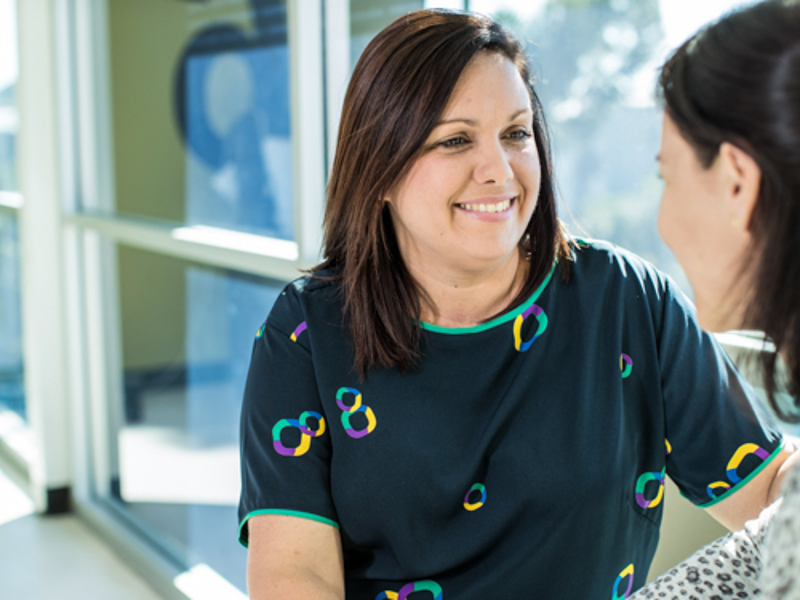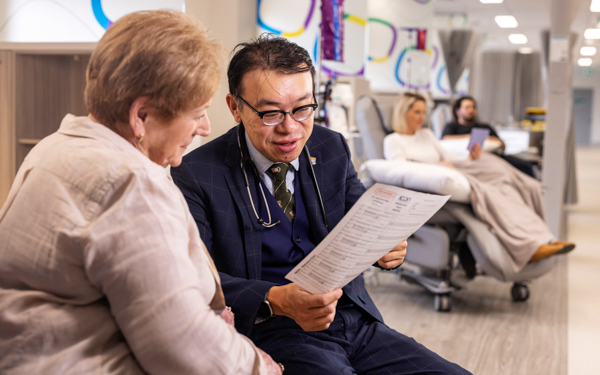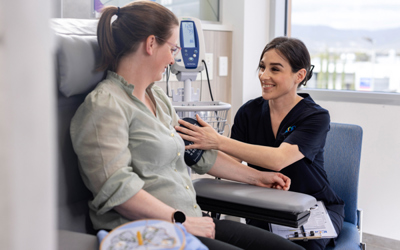Genes and mutations
We all have thousands of genes that provide the instructions for our bodies to function optimally.
All cancers begin when changes occur in our genes. A change in a gene that disrupts its function is called a ‘mutation’, a “gene fault” or a ‘pathogenic variant’. Cancer usually results from an accumulation of many mutations. Most of the time, those mutations are confined (at least initially) to genes in the cells of the organ or tissue where they started. We call these type of genetic mutations ‘somatic’. Somatic mutations are not inherited from our parents, and they are not passed down to our children. This is why the majority of cancers do not ‘run in families’.
A small number of people are born with a gene fault or mutation that increases their chance of developing certain types of cancer.
In these people, cancer can get a ‘head start’ because when the first mutation is inherited from a parent it is present in every cell of a person’s body. This does not mean that a person will develop cancer in every cell of their body. In fact, we know that even when people are born with these gene faults or mutations, it is not guaranteed that they will develop cancer, but they are at a higher chance of developing certain types of cancer, depending on which specific gene is involved.
Understanding hereditary breast and ovarian cancer
In the mid 1990’s, scientists discovered the first two genes in which inherited mutations can increase a person’s chance of developing breast and ovarian cancer. They were named BRCA1 and BRCA2 for BReast CAncer genes 1 and 2. All people, both male and female, have two copies of both BRCA1 and BRCA2, one inherited from their mother and one inherited from their father. BRCA1 and BRCA2 belong to a family of genes called tumour suppressor genes, and their normal job is to protect us from developing cancer. It is only when a mutation occurs that disables one of these genes that a person becomes predisposed to cancer. BRCA1 and BRCA2 are what is known as “high penetrance” genes. That means that a mutation in these genes causes a high risk of cancer in the person who carries it.
A woman who carries a mutation in one of her two copies of BRCA1 or BRCA2 has approximately a 70% chance of developing breast cancer over a normal lifespan. She also has a 44% lifetime risk (BRCA1 mutations1) or a 17% lifetime risk (BRCA2 mutations2) of developing ovarian cancer.
Carriers of BRCA2 mutations also have an increased risk of developing pancreatic cancer, and, for males, prostate cancer and male breast cancer.
BRCA1 and BRCA2 were the first genes discovered to be involved in hereditary breast and ovarian cancer, and for more than a decade they were the only ones we knew about. However, in the last decade many more genes have been discovered, mutations in which also predispose women to either breast cancer, to ovarian cancer, or to both. Some also cause other types of cancer.
However, most of the more recently discovered genes have a lower ‘penetrance’ than BRCA1 or BRCA2, meaning that they confer a smaller lifetime risk of developing cancer than the 70% we see in BRCA1 and BRCA2. It is likely that more genes which can predispose to breast or ovarian cancer will be discovered in coming years.
I have had breast cancer – could it be hereditary?
Breast cancer is one of the most common cancers affecting women, affecting approximately 1 in 7 of Australian women3. Inherited mutations in the BRCA1 and BRCA2 genes are rare – found in only around 1/225 – 1/500 (0.2% – 0.4%) of people4, and mutations in many of the other breast cancer genes are even rarer.
So, the majority of people who are diagnosed with breast cancer will not have an inherited gene fault predisposing to breast cancer.
A person who has inherited a mutation in a breast cancer predisposing gene will often (but not always) have some of the following features in themselves or in their family history:
Individuals who have been diagnosed with breast cancer at a young age (under 50-years-old)
More than two relatives on the same side of the family who have also been diagnosed with breast cancer
Relatives who have had ovarian cancer, prostate cancer or pancreatic cancer, especially if they were young at the time of diagnosis
Males relatives who have had breast cancer
Ashkenazi Jewish ancestry (Jewish ancestors who came from central or Eastern Europe)
Sometimes, even in the absence of any of these features, a woman whose breast cancer has specific features (such as ‘grade 3 triple negative’ breast cancer, which has no receptors for oestrogen, progesterone and does not over-express the HER2 protein) may be at increased risk of having a hereditary predisposition to breast cancer.
If you have been diagnosed with breast cancer, ask your doctor whether they feel that genetic testing would be indicated for you. It will be helpful if you can collect information about your family history of cancer prior to having this discussion.
Your doctor may organise genetic testing for you directly, or they may refer you to a genetic counsellor/genetics clinic or familial cancer service to have this done.

I have had ovarian cancer – could it be hereditary?
Ovarian cancer is less common than breast cancer, affecting just under 1% of Australian women. There are several different types of ovarian cancer and some of them (such as cancers arising from egg cells) are rarely hereditary. But for other types of ovarian cancer, more than 10% can be caused by hereditary gene mutations.
A person who has inherited a mutation in an ovarian cancer predisposing gene will often (but not always) have some of the following features in themselves or in their family history:
Individuals who have been diagnosed with ovarian cancer at a young age (under 50-years-old)
More than two relatives on the same side of the family who have also suffered from breast or ovarian cancer, especially if any were diagnosed under 50 years of age
Relatives who have had prostate cancer or pancreatic cancer
Males relatives who have had breast cancer
Ashkenazi Jewish ancestry (Jewish ancestors who came from central or Eastern Europe)
A personal or family history of bowel or uterine cancer
Sometimes, even in the absence of any of these features, a woman whose cancer has specific features (a high grade serous ovarian cancer, or a cancer arising in the fallopian tube or the peritoneum) may be at increased risk of having a hereditary predisposition to ovarian cancer. Sometimes genetic testing is performed on the DNA from ovarian tumours by oncologists, to help determine which drugs would work best to treat the tumour. If this genetic testing finds a mutation in an ovarian cancer predisposing gene, such as BRCA1 or BRCA2, follow up genetic testing on DNA from a blood sample is recommended to find out if the mutation that was found in the tumour is somatic (i.e. has arisen in and is confined to the tumour) or if it is inherited.
Sometimes a special protein-staining test is performed on ovarian tumours. If this special test reveals that certain proteins are missing in the tumour, follow up genetic testing on DNA from a blood sample is recommended to find out if the person might have Lynch syndrome (an inherited predisposition to bowel, uterine and ovarian cancer). If you have been diagnosed with ovarian cancer, ask your doctor whether they feel that genetic testing would be indicated for you. It will be helpful if you can collect information about your family history of cancer prior to having this discussion. Your doctor may organise genetic testing for you directly, or they may refer you to a genetic counsellor/genetics clinic or familial cancer service to have this done.
What does genetic testing involve and how much is it?
Genetic testing can be done using DNA extracted from white blood cells (a blood test) or from cells present in saliva. Unlike regular blood tests, it usually takes around four to six weeks (instead of days) to get a result.

In Australia, genetic testing for hereditary breast cancer and ovarian cancer is funded by Medicare only when certain criteria about the tumour and family history are met. The test can only be requested by a specialist (for example, a geneticist, surgeon or oncologist) or by a genetic counsellor. This type of testing cannot be accessed through your GP. Your specialist or genetic counsellor can assess whether or not you meet the criteria for Medicare funded testing. If you do not meet the Medicare criteria, you can still have genetic testing, but you will need to cover the cost of this. Genetic testing usually costs approximately $350 – $500 depending on the number of genes tested and the laboratory performing the testing.
Frequently asked questions
I’m not sure if I would want to know…
Genetic testing is not for everyone. There are pros and cons, advantages and disadvantages to be considered. Some people feel that the advantages outweigh the disadvantages, others feel the opposite. It is a very personal decision and there is no right or wrong decision to be made. Often it can helpful to talk over the pros and cons of your particular situation with someone who understands the issues. This is where a genetic counsellor can help. A genetic counsellor’s job is to help you to arrive at the decision that is right for you, whether this is to have genetic testing or not to have genetic testing. If you decide to have genetic testing, a genetic counsellor can help you to work out which test is the right test for you and guide you through the process. If you decide not to have genetic testing, a genetic counsellor can give you guidance on the type of cancer screening that would be right for you given your family history. You can find the nearest genetic counselling service to you here: Clinical Genetic Services (hgsa.org.au)
Icon Cancer Centre Hobart is proud to offer a dedicated private genetic counselling service within their centre. Learn more about this service.
References
The content on the Icon Cancer Centre website is for informational purposes only and should not be considered medical advice. It is not a substitute for consultation with a qualified medical practitioner. For personalised medical guidance, please consult with your GP or another qualified healthcare provider.






